人教PEP版小学英语 五年级下册第一单元Unit 1《课时7:Story time》教学课件PPT
(完整版)新版PEP小学英语五年级下册unit1Myday教案
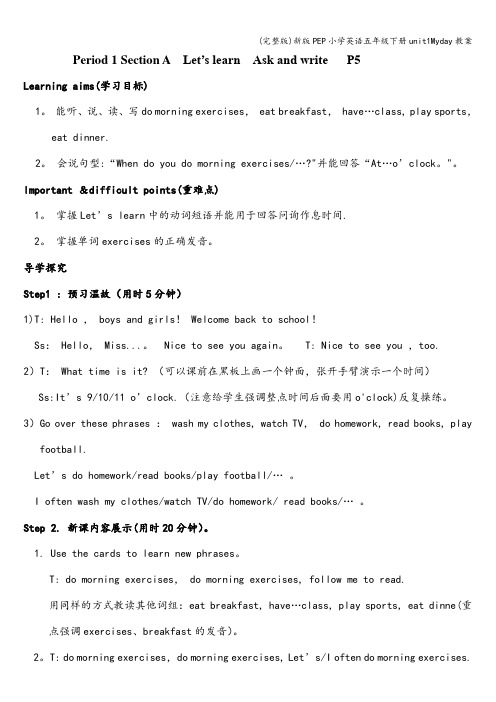
Period 1 Section A Let’s learn Ask and write P5Learning aims(学习目标)1。
能听、说、读、写do morning exercises, eat breakfast,have…class, play sports,eat dinner.2。
会说句型:“When do you do morning exercises/…?"并能回答“At…o’clock。
"。
Important &difficult points(重难点)1。
掌握Let’s learn中的动词短语并能用于回答问询作息时间.2。
掌握单词exercises的正确发音。
导学探究Step1 : 预习温故(用时5分钟)1)T: Hello , boys and girls! Welcome back to school!Ss: Hello, Miss...。
Nice to see you again。
T: Nice to see you ,too.2)T: What time is it? (可以课前在黑板上画一个钟面,张开手臂演示一个时间)Ss:It’s 9/10/11 o’clock.(注意给学生强调整点时间后面要用o'clock)反复操练。
3)Go over these phrases : wash my clothes, watch TV, do homework, read books, play football.Let’s do homework/read books/play football/… 。
I often wash my clothes/watch TV/do homework/ read books/… 。
Step 2. 新课内容展示(用时20分钟)。
1. Use the cards to learn new phrases。
PEP人教版小学英语五年级下册全册各课时教学反思
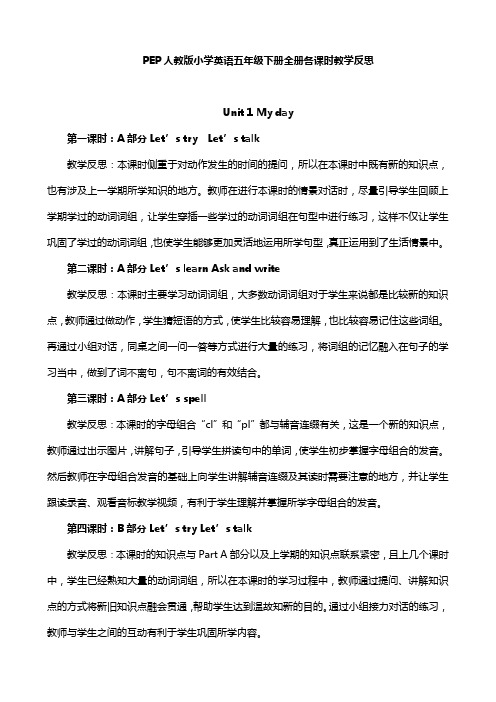
PEP人教版小学英语五年级下册全册各课时教学反思Unit 1 My day第一课时:A部分Let’s try Let’s talk教学反思:本课时侧重于对动作发生的时间的提问,所以在本课时中既有新的知识点,也有涉及上一学期所学知识的地方。
教师在进行本课时的情景对话时,尽量引导学生回顾上学期学过的动词词组,让学生穿插一些学过的动词词组在句型中进行练习,这样不仅让学生巩固了学过的动词词组,也使学生能够更加灵活地运用所学句型,真正运用到了生活情景中。
第二课时:A部分Let’s learn Ask and write教学反思:本课时主要学习动词词组,大多数动词词组对于学生来说都是比较新的知识点,教师通过做动作,学生猜短语的方式,使学生比较容易理解,也比较容易记住这些词组。
再通过小组对话,同桌之间一问一答等方式进行大量的练习,将词组的记忆融入在句子的学习当中,做到了词不离句,句不离词的有效结合。
第三课时:A部分Let’s spell教学反思:本课时的字母组合“cl”和“pl”都与辅音连缀有关,这是一个新的知识点,教师通过出示图片,讲解句子,引导学生拼读句中的单词,使学生初步掌握字母组合的发音。
然后教师在字母组合发音的基础上向学生讲解辅音连缀及其读时需要注意的地方,并让学生跟读录音、观看音标教学视频,有利于学生理解并掌握所学字母组合的发音。
第四课时:B部分Let’s try Let’s talk教学反思:本课时的知识点与Part A部分以及上学期的知识点联系紧密,且上几个课时中,学生已经熟知大量的动词词组,所以在本课时的学习过程中,教师通过提问、讲解知识点的方式将新旧知识点融会贯通,帮助学生达到温故知新的目的。
通过小组接力对话的练习,教师与学生之间的互动有利于学生巩固所学内容。
第五课时:B部分Let’s learn Do a survey教学反思:1.本课时学习了更多的动词词组,教师从动词词组的词意下手,辅以讲解动词词组的相关知识点,引导学生掌握动词词组。
人教精通版英语五年级下册Unit1 Lesson1【教学设计】
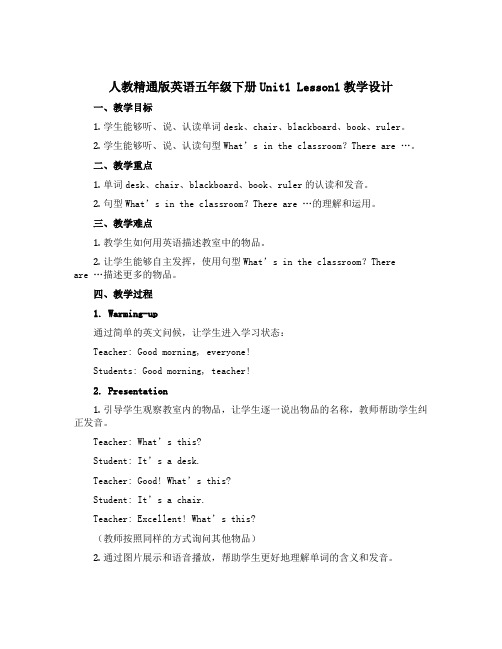
人教精通版英语五年级下册Unit1 Lesson1教学设计一、教学目标1.学生能够听、说、认读单词desk、chair、blackboard、book、ruler。
2.学生能够听、说、认读句型What’s in the classroom?There are …。
二、教学重点1.单词desk、chair、blackboard、book、ruler的认读和发音。
2.句型What’s in the classroom?There are …的理解和运用。
三、教学难点1.教学生如何用英语描述教室中的物品。
2.让学生能够自主发挥,使用句型What’s in the classroom?Thereare …描述更多的物品。
四、教学过程1. Warming-up通过简单的英文问候,让学生进入学习状态:Teacher: Good morning, everyone!Students: Good morning, teacher!2. Presentation1.引导学生观察教室内的物品,让学生逐一说出物品的名称,教师帮助学生纠正发音。
Teacher: What’s this?Student: It’s a desk.Teacher: Good! What’s this?Student: It’s a chair.Teacher: Excellent! What’s this?(教师按照同样的方式询问其他物品)2.通过图片展示和语音播放,帮助学生更好地理解单词的含义和发音。
3. Practice1.带着学生使用句型What’s in the classroom? There are …来描述教室中的物品。
Teacher: What’s in the classroom?Student: There are four desks, six chairs, a blackboard, some books and a ruler.2.让学生以小组为单位,在课堂上巡视一圈,自主发挥,使用句型What’s in the classroom?There are …来描述教室中的更多物品。
小学英语人教版PEP五年级下册1-6单元知识点总结

Unit1 My day一、基本句型1.询问什么时候做某事:- When do you ……?你什么时候……?- I usually…at …. 我通常在…(点钟)…。
例:-When do you eat breakfast?-I eat breakfast at 7:00.2.What do you do on the weekend?你周末做什么?- I +频率副词+周末活动+时间。
或Sometimes I+周末活动例句:I sometimes go shopping with my mum on the weekend.(周末我时候和妈妈一起去购物)二、知识点:1.频率副词:always(总是,一直)>usually(通常)>often(经常)>sometimes(有时)2.只有Sometimes可以放在句首。
(Sometimes I cook dinner.)3.On the weekend 在周末on Saturdays 在周六on Sundays在周日(别忘加s)Unit2 My favourite season1.-Which season do you like best? (你最喜欢哪个季节?)Why?(为什么)-I like +季节+ best.(I like spring∕summer∕fall∕winter best) Because ___________.(因为)或:-What‘s your favourite season? -My favourite season is spring∕summer∕fall∕winter.2.-Why do you like winter best?(你为什么最喜欢冬天?) -Because______.二、知识点:1.leaf(树叶):复数leaves2.W,W真神奇,问出许多大问题。
what,what,问“什么”,when,when,问“时间”,where,where,问“哪里”,which,which,“哪一个”,why,why,“为什么”.Unit3 My school calendar补充:1.Dragon Boat Festival 龙舟节或端午节(农历五月五日)一般在阳历6月2.月份首字母大写。
(完整版)小学英语人教PEP五年级下册新版(课文+单词表)
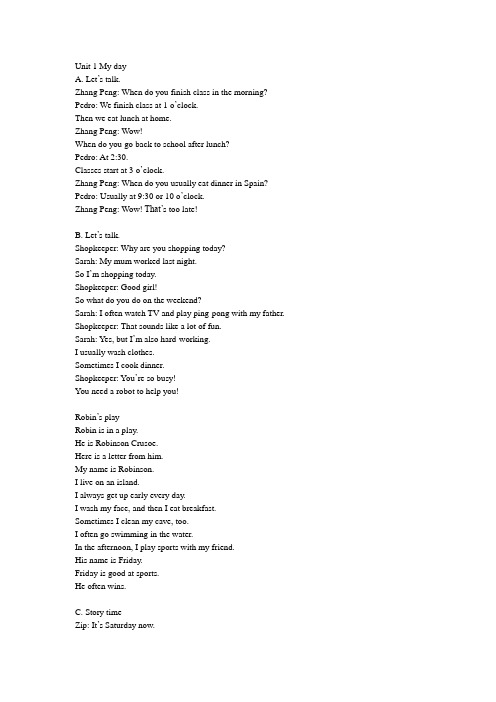
Unit 1 My dayA. Let’s talk.Zhang Peng: When do you finish class in the morning? Pedro: We finish class at 1 o’clock.Then we eat lunch at home.Zhang Peng: Wow!When do you go back to school after lunch?Pedro: At 2:30.Classes start at 3 o’clock.Zhang Peng: When do you usually eat dinner in Spain? Pedro: Usually at 9:30 or 10 o’clock.Zhang Peng: Wow! That’s too late!B. Let’s talk.Shopkeeper: Why are you shopping today?Sarah: My mum worked last night.So I’m shopping today.Shopkeeper: Good girl!So what do you do on the weekend?Sarah: I often watch TV and play ping-pong with my father. Shopkeeper: That sounds like a lot of fun.Sarah: Yes, but I’m also hard-working.I usually wash clothes.Sometimes I cook dinner.Shopkeeper: You’re so busy!You need a robot to help you!Robin’s playRobin is in a play.He is Robinson Crusoe.Here is a letter from him.My name is Robinson.I live on an island.I always get up early every day.I wash my face, and then I eat breakfast.Sometimes I clean my cave, too.I often go swimming in the water.In the afternoon, I play sports with my friend.His name is Friday.Friday is good at sports.He often wins.C. Story timeZip: It’s Saturday now.Zoom, I’m always very busy.Zoom: Why?Zip: Let me see.From Monday to Wednesday, I usually collect nuts in the afternoon. Zoom: What else?Zip: On Thursday, I often dry my nuts in the sun.Zip: On Friday, I eat nuts with my friends.Zoom: What do you usually do on the weekend?Zip: I often watch TV, but this weekend I have a show.I’ll play the pipa.Zoom: When?Zip: Saturday, at 12 o’clock.Oh, no!Words in unit 1eat breakfast 吃早饭have … class上……课play sports 进行体育运动exercise 活动;运动do morning exercises 早锻炼eat dinner 吃晚饭clean my room 打扫我的房间go for a walk 散步go shopping 去买东西;购物take 学习;上(课)dancing 跳舞;舞蹈take a dancing class 上舞蹈课when 什么时候;何时after 在(时间)后start 开始usually 通常地;惯常地Spain西班牙late晚;迟a.m. 午前;上午p.m. 午后;下午why 为什么shop 去买东西;购物work 工作last 上一个的;刚过去的sound 听起来好像also 还;也busy忙的need 需要play 戏剧;剧本letter 信for 表示接受某事物的人live 居住island 岛always 总是,一直cave 山洞;洞穴go swimming 去游泳win 获胜Unit 2 My favourite seasonA. Let’s talkMr Jones: Do you like the music, children?Mike: Yes. It’s very beautiful.What is it?Mr Jones: The Four Seasons.Today we’ll draw the seasons.Which season do you like best, Mike?Mike: Winter. I like snow.Mr Jones: I like snow, too.Which season do you like best, Wu Yifan?Wu Yifan: Spring. It’s pretty.Mr Jones: Yes, it is.B. Let’s talkAmy: Hello, Miss White.Look at my picture.Miss White: Good job!I like the trees.The colours are very pretty.Amy: Yes. I like autumn best.The weather is good and the colours are beautiful!Which season do you like beat, Miss White?Miss White: Summer.Amy: Why?Miss White: Because I like summer vacation!Robin likes them all!Look at the green trees and pink flowers.I like spring because there are beautiful flowers everywhere. The weather is hot, hot, hot!I like summer, but I can’t swim.What lovely colours!The leaves fall and fall and fall.I love fall!Wow! I want to paint a picture, too!There is lots of snow.It is white everywhere.I like winter because I can play in the snow.Story timeZip &Zoom: Welcome!Koala: Thank you. Merry Christmas!Zip &Zoom: Merry Christmas!Zoom: What do you usually do on Christmas Day?Koala: I usually go to the beach and swim in the sea!Zoom: You swim in winter?Koala: Christmas is in summer in Australia, so we never have snow for Christmas. Zoom: Which season do you like best?Koala: Summer. I like sunny days.Koala: Wow! A white Christmas!Zoom: Let’s make a snowman.Zip &Koala: Great!Zip: Say “cheese”!Koala: Cheese!Words in unit 2spring 春天summer 夏天autumn 秋天winter 冬天season 季节picnic 野餐go on a picnic 去野餐pick 摘;采集pick apples 摘苹果snowman 雪人make a snowman 堆雪人go swimming 去游泳which 哪一个best 最好地snow 雪good job做得好because 因为vacation 假期all 全,完全pink 粉色;粉色的lovely 可爱的;美丽的leaf 叶子fall 落下;【美】秋天paint 用颜料绘画Unit 3 My school calendarA – Let’s talk.Mike: We have a few fun things in spring. After the sports meet, we have an Easter party. Zhang Peng: When is the party?Mike: It’s in April.We have a school trip, too.Zhang Peng: When is that?Mike: It’s in May.Zhang Peng: Cool!B – Let’s talk.Oliver: Autumn is my favourite season.I really like the colours.Chen Jie: I like autumn, too.We usually have a school trip in autumn. Oliver: Great!When is the trip this year?Chen Jie: It’s in October.We’ll go to the Great Wall.Oliver: Cool!I love the Great Wall!B – Easter PartyWHEN: April 12th, 7 p.m.WHY: Easter holidayWHERE: Wu Yifan’s homeWHAT: We will play many games.We will roll Easter eggs.We will look for eggs.We will eat chocolate eggs.You will meet the Easter Bunny!RSVP: Will you come to the party?Please send me an email by March 23rd. Robin@.C – Story timeZoom: Look at my summer vacation plan! Zip: It’s April now.The summer vacation is still three months away. Zoom: Early planning is always good.Zoom: In July I’ll visit my grandparents.They live in Xinjiang.Zip: What will you do there?Zoom: We’ll go to the Grape Valley.The grapes there are very sweet!Grapes are my favourite fruit!Zoom: In August, I’ll go to Huangshan Moutain.The trees there are very famous.The clouds are beautiful.Zip: Sounds great!Zip: You have a great plan, but what will you do this weekend? Zoom: This weekend?Zip: There is a maths test next Monday.So please study hard.Zoom: Oh my! I forgot!Words in unit 3January 一月February 二月March 三月April 四月May 五月June 六月July 七月August 八月September 九月October 十月November 十一月December 十二月plant 种植contest 比赛;竞赛year 年few 一些a few 一些thing 事情meet 集会;开会sports meet运动会Easter 复活节trip 旅行national 国家的National Day 国庆日American 美国的Thanksgiving 感恩节Christmas 圣诞节Great Wall 长城holiday 假日;节日game 游戏roll 滚动look for 寻找chocolate 巧克力bunny (用作儿语)兔子RSVP(尤用于请柬)请赐复by 在……之前Recycle 1-1Sarah will visit Sydney in April.She asks Stella, a friend there, about the weather.Here is Stella’s reply.Hi, Sarah!It is autumn in April here in Sydney.Autumn is my favourite season!It is warm in the day and cool at night.Many people visit us in autumn because they like the weather. When you come, you can visit the Sydney Royal Easter Show. It is the largesse event in Australia.What is the weather like in April in you city?What do you often do?All best,StellaRecycle 1-2Sarah often reads to Sam.This is a poem that Sarah will read today.Bed in SummerBy Robert Louis StevensonIn winter I get up at nightAnd dress by yellow candlelight.In summer, quite the other way,I have to go bed by day.I have to go to bed and seeThe birds still hopping on the tree,Or hear the grown-up people’s feetStill going past me in the street.And does it seem hard to you,When all the sky is clear and blue,And I should like so much to play.To have to go to bed by day?Unit 4 When is Easter?A – Let’s talk.Mr Jones: There are some special days in April.Zhang Peng: What are they?Mr Jones: April Fool’s Day and Easter.Zhang Peng: When is April Fool’s Day?Mr Jones: It’s on April 1st.Zhang Peng: And Easter?Mr Jones: It’s on April 5th this year.Zhang Peng: Wow! I love April.B—Let’s talkChen Jie: When is your birthday?Mike: My birthday is on April 4th.Chen Jie: That’s my mother’s birthday, too!Mike: Cool! What will you do your mum?Chen Jie: I’ll cook noodles for her.Mike: Chinese noodles are delicious!Chen Jie: Please come then. We can have a birthday party for both of you!Two new kittensSarah’s cat has two kittens.Read Sarah’s diary.April 15thMy cat has two new kittens.They are pink, because they are very young.They still can’t see.April 21stThe kittens are six days old.They make noises when they are hungry.They have white fur now.They are cute.April 26thTheir eyes are open!They are blue.May 3rdThe kittens can walk now.They can play with Robin!C—Story timeApril 30thMusic teacher: The singing test will be on May 4th.Zoom: I can’t sing well.Zip: Don’t worry.Practice makes perfect.May 1stZip: Will you come to the party?Today is Rabbit’s birthday.Zoom: Sorry, I can’t.I want to practise my song.May 2ndRabbit: Will you play football with me after school? Zoom: Sorry, I can’t.I want to practise the song.May 3rdCat: Let’s watch TV together.Zoom: Sorry. I need more practice.May 4thMusic teacher: Good job, Zoom.Zoom: Thank you, Miss Bird.Cat: I’ll go swimming tonight.Will you go?Zoom: Of course!Words in unit 4first (1st)第一的second (2nd)第二的third (3rd)第三的fourth (4th)第四的fifth (5th)第五的twelfth (12th)第十二的twentieth (20th)第二十的twenty-first (21st)第二十一的twenty-third (23rd)第二十三的thirtieth (30th)第三十的fool 蠢人;傻瓜special 特别的;特殊的kitten 小猫diary 日记still 仍然;依旧;还是noise 声音;响声(尤指)噪音fur (某些动物的)浓密的软毛open 开着的walk 行走Unit 5 Whose dog is it?A—Let’s talkChen Jie: The yellow picture is mine.Are these all ours?Mike: Yes, they are.Chen Jie: Wow! That picture of Beijing is beautiful. Whose is it?Mike: It’s Zhang Peng’s.Chen Jie: Look! There is a picture of Shanghai, too.Mike: It’s Yifan’s.Chen Jie: Oh, yes! It’s his.B—Let’s talk(Sam is at Chen Jie’s home.)Sam: Where is Fido now?Chen Jie: He’s in the kitchen.Sam: Is he drinking water?Chen Jie: No, he isn’t.He’s eating.Sam: Can I play with him now?Chen Jie: Yes. Can you take him to the park? Sam: Woof, woof!Robin at the zooSarah and Robin are at the zoo.Robin is excited!I’m looking at a bear.I’m dancing like a bear.I’m looking at the rabbits.I’m eating like a rabbit.I’m looking at a tiger.I’m running like a tiger.I’m looking at an elephant.I’m walking like an elephant.I’m looking at a monkey.I’m climbing like him.I’m looking at a bird.I like flying.I want to be a bird.Robin, do you want to swim like a fish?No! No! I don’t want to be a fish!C—Story timeZip: Here comes a tiger.Zoom: Where is it?Zip: Shh. Be quiet.Zoom: Ah-choo!Zip: Whose tail is that?It’s running so fast.Zoom: Is it the tiger?Zip: Yes, it is.Zip: I see two monkeys.Zoom: Where are they?Zip: Shh. They’re climbing.Zoom: Wow! They’re fast, too.Zoom: What are they doing?Zip: Why are they looking at us?Zoom: I don’t know.Zip: Look! They’re taking pictures, too.Zoom: That’s cute.They’re copying us!Words in unit 5mine 我的yours 你(们)的his 他的hers 她的theirs 他们的;她们的;它们的ours 我们的climbing (climb的-ing形式)(正在)攀登;攀爬eating(eat的-ing形式)(正在)吃playing(play的-ing形式)(正在)玩耍jumping(jump的-ing形式)(正在)跳drinking(drink的-ing形式)(正在)喝(水)sleeping(sleep的-ing形式)(正在)睡觉each 每一;各个other 其他的each other 相互excited 兴奋的;激动的like 像……那样Unit 6 Work quietly!A—Let’s talkChen Jie: Look at the pandas.Mike: What are they doing?Chen Jie: Haha. They’re eating lunch!They’re so cute.Mike: Oh, yes! They like bamboo.Chen Jie: What’s the little monkey doing?Mike: it’s playing with its mother!Chen Jie: Do you see any elephants?Mike: Yes! Look there!The elephant is drinking water.B—Let’s talkTom: My name is Tom.What’s your name?John: Shh. Talk quietly.I’m John.I can show you the English books. Tom: Thanks.John: Here they are.Tom: OK. Can I read the books here? John: Yes. Of course.Tom: Anything else?John: Yes. Keep your desk clean. Tom: OK, I will.Thanks.The world robot exhibitionNi hao. Ni zai gan shen me ne? Sorry. What are you saying?I’m speaking Chinese.Oh, hello.What are you doing?I’m drawing a picture.Have a look.It’s lovely.Are you cooking?Yes. I’m cooking rice.Asako is making sushi.Can we play music with you? Sure. Please take turns.Are you from China?Yes, I am.You’re so cool!Can you teach me?Sure!Are you doing kung fu?Yes, I am.I’ll show you.C—Story timeZip: I love the film.Zoom: Yes. The gorilla is great!Zip: Wow! The gorilla is eating bananas.Zoom: It’s so big and strong.Zip: What’s that noise?Zoom: I’m eating popcorn.Zip: It’s so exciting!Zoom: Yes, it is!Tiger: Shh! Talk quietly!Zoom: Sorry!Zip: Look at the sign.Zoom: Oh, no!Words in unit 6doing morning exercises(正在)早锻炼having … class(正在)上课eating lunch(正在)吃午饭reading a book(正在)看书listening to music(正在)听音乐keep保持某种状态keep to the right靠右keep your desk clean 保持你的课桌整洁talk quietly 小声讲话turn 顺序take turns 按顺序来bamboo 竹子its它的;他的(指事物、动物或幼儿)show 引导;指引anything 任何事物else 另外;其他exhibition 展览say 说;讲have a look 看一看sushi 寿司teach 教Canadian 加拿大的Spanish 西班牙的Recycle 2Thirty days has September, April, June and November; February has twenty-eight alone.All the rest have thirty-oneExcept in leap year.That’s the timeWhen February’s days are twenty-nine.。
新人教PEP版五年级英语下册Unit 1 My day 单元教学解读

新人教PEP版五年级英语下册Unit 1My day单元教学解读本单元的主题是“我的一天”。
此部分主要分为Main scene、A、B和C四个部分。
Main scene用以导入本单元的话题,是本单元所学知识的总体概括。
A部分主要包括Let’s try、Let’s talk、Let’s learn、Ask and write、Let’s spell五个环节。
此部分主要学习句型“When do you+动词原形(+其他)?”及其答语以及有关日常作息活动的短语。
在这一部分,学生还需要学习字母组合cl和pl 在单词中的发音规律,并能正确拼读含字母组合cl和pl的单词。
B部分主要包括Let’s try、Let’s talk、Let’s learn、Do a survey、Read and write、Let’s check和Let’s wrap it up七个环节。
此部分主要学习句型“What do you do on the weekend?”及其答语以及有关日常活动的短语。
此外,此部分还增设了几个练习环节,帮助学生巩固重点知识。
C部分主要包含Story time一个环节。
它以趣味故事的形式帮助学生巩固已学知识,并延伸知识面。
本单元是本学期英语学习的第一单元,因此激发学生的学习热情至关重要。
教师在开展教学时,要注意结合多种趣味的教学方式,引导学生积极地参与到课堂上来。
本单元重点学习谈论某人一天的日程安排及周末的活动安排。
这一话题与学生的日常生活息息相关,学生的学习热情会相对较高。
而“周末的活动安排”这一话题在五年级上册第二单元的B部分已有所接触,教师在开展教学时,要注意以旧引新,循序渐进地引入本单元的教学内容,降低学生的学习难度。
1.能够听、说、读、写本单元的有关日常作息以及日常活动的短语;2.能够听、说、认读本单元的三会词汇;3.能够听、说、读、写句子:When do you finish class in the morning?We finish class at 1 o’clock.So what do you do on the weekend?I often watch TV and play ping-pong with my father.I usually wash my clothes.Sometimes I cook dinner.4.能够运用句型“When do you+动词原形(+其他)?”询问某人做某事的时间并作答;5.能够运用句型“What do you do on the weekend?”询问某人周末的活动安排并作答;6.能够掌握字母组合cl和pl在单词中的发音规律,并能正确拼读含字母组合cl 和pl 的单词;7.能够正确使用频度副词always 、usually 、often 、sometimes ;8.能够完成本单元教材上的相关练习。
五年级 英语人教版PEP下册Unit1_单元教学分析

PEP小学英语五年级下册单元教学分析第一单元【主题】My day【教材分析】本单元主要学习与学生生活相关的日常活动表达,包括平时常规活动和周末活动,以及与之有关的句型。
要求学生能听、说、认读活动词组eat breakfast, have … class, play sports, do morning exercises, eat dinner, clean my room, go for a walk, go shopping, take a dancing class。
能够根据指令做出相应的动作,学会运用句型:When do you …? I … at … What do you do on the weekend? I often …教授时可以利用旧句型What do you have on Mondays? What time is it? 来引出新句型。
还可以借用五年级上册第二、四单元学习过的活动词组丰富本单元的教学内容,让学生复习以前学的知识,体现知识的前后联系。
本单元还有一个过渡句型:Why are you shopping today? 学生对其有初步的认识即可,第二单元会做重点学习。
关于感叹句Wow! Good girl! That sounds like a lot of fun! 应让学生在语境中体会和运用。
【学情分析】五年级的孩子有一定量的语言积累,也具有简单的语言运用能力。
他们乐于感知并积极尝试用英语对话,善于用英语参与合作表演,也乐于接触西方文化。
他们在五年级上册第二单元和第四单元学习过日常生活常用活动词组,如:do homework, read books, play football, draw cartoons等等。
也学习过关于时间的问答“It’s 6o’clock.” “On the weekend.” “On Saturday.” 学习本单元时,“do morning exercises” “play sports”容易忘记词尾的s。
五年级英语下册第一单元课文

五年级英语下册第一单元课文:Module1 Unit 1 She was a driver before1.Listen and chant .My father is a doctor .His name is Drew.He loves me very much .I love him , too .My mother is a driver .Her name is Sue.She loves me very much .And I love her , too .2.Listen , read and act out .Lingling : Look ! This is my grandma . She was young in this picture .Lingling :She was a driver before .Sam :What did she drive ?Lingling:She drove the bus .Amy: Who’s this ?Lingling :It is my grandma . He was a flute player before .Sam : What music did he play ?Lingling :He played Chinese music .Lingling : I can play the flute , too .Amy and Sam :Oh,no ! You can’t !Module 1 Unit 2 He worked in an office1.Look , listen and say .That is my grandpa. He is fishing . He was a train driver before . He’s got a train !2.Listen and read .Look at the picture . This is my family .This is my grandpa . He worked in an office . This is my grandma . She worked in a factory .This is my father . He works in a hospital . This is my mother . She works in a shop .And this is me . We are a happy family.。
Unit1Myday(教案)人教PEP版英语五年级下册
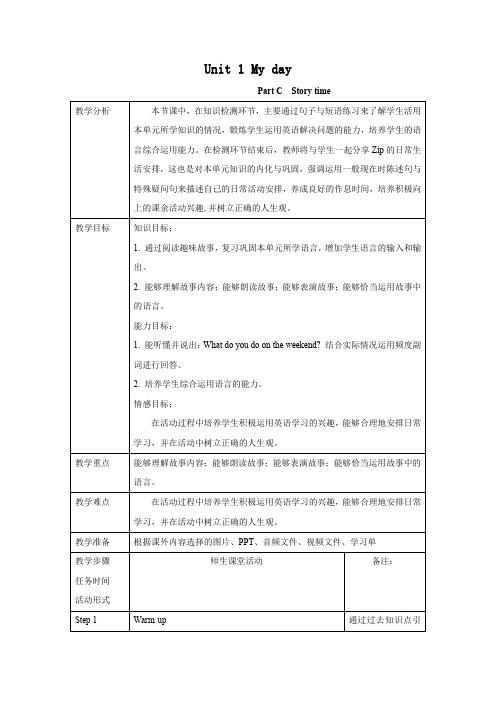
Watch and answer:Is Zip busy?引导学生带着问题观看故事视频。
3.Watch picture2 --picture5
Read the story again and try to finish the table.
(1)What does Zip usually do from Monday to Wednesday?
Homework
分钟
Whole class
Homework:
1. Read the story with emotions.
2. Act the story out with your friends with proper intonation.
检测学生对故事的理解情况。
板书设计
Unit 1 My day
Unit 1 My day
Part CStory time
教学分析
本节课中,在知识检测环节,主要通过句子与短语练习来了解学生活用本单元所学知识的情况,锻炼学生运用英语解决问题的能力,培养学生的语言综合运用能力。在检测环节结束后,教师将与学生一起分享Zip的日常生活安排,这也是对本单元知识的内化与巩固,强调运用一般现在时陈述句与特殊疑问句来描述自己的日常活动安排,养成良好的作息时间,培养积极向上的课余活动兴趣,并树立正确的人生观。
小结:Share can make us happy!
(3)Read picture5 by yourself.Answer the two questions.What does Zip usually do on the weekend?How about this weekend?
人教PEP五年级英语下册《Unit1_A_Let’s_talk名师精品教案》
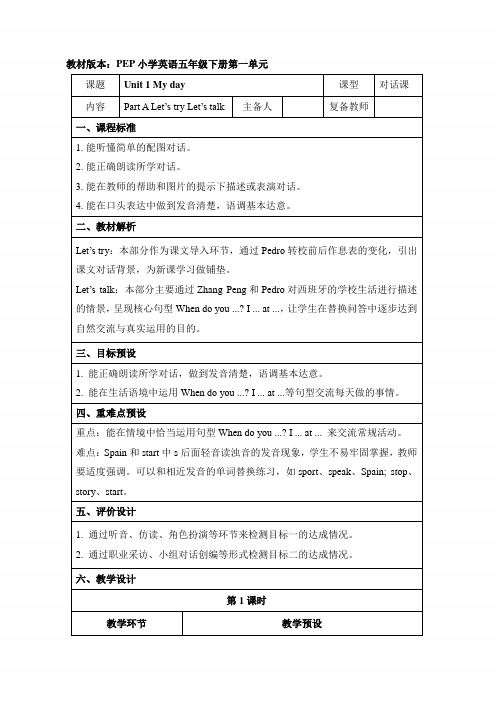
教材版本:PEP小学英语五年级下册第一单元课题Unit 1 My day课型对话课内容Part A Let’s try Let’s talk 主备人复备教师一、课程标准1.能听懂简单的配图对话。
2.能正确朗读所学对话。
3.能在教师的帮助和图片的提示下描述或表演对话。
4.能在口头表达中做到发音清楚,语调基本达意。
二、教材解析Let’s try:本部分作为课文导入环节,通过Pedro转校前后作息表的变化,引出课文对话背景,为新课学习做铺垫。
Let’s talk:本部分主要通过Zhang Peng和Pedro对西班牙的学校生活进行描述的情景,呈现核心句型When do you ...? I ... at ...,让学生在替换问答中逐步达到自然交流与真实运用的目的。
三、目标预设1. 能正确朗读所学对话,做到发音清楚,语调基本达意。
2. 能在生活语境中运用When do you ...? I ... at ...等句型交流每天做的事情。
四、重难点预设重点:能在情境中恰当运用句型When do you ...? I ... at ... 来交流常规活动。
难点:Spain和start中s后面轻音读浊音的发音现象,学生不易牢固掌握,教师要适度强调。
可以和相近发音的单词替换练习,如sport、speak、Spain; stop、story、start。
五、评价设计1. 通过听音、仿读、角色扮演等环节来检测目标一的达成情况。
2. 通过职业采访、小组对话创编等形式检测目标二的达成情况。
六、教学设计第1课时教学环节教学预设热身/复习(Warm-up/Revision)1. 师生日常问候T: Good morning, everyone. What day is it today? (Monday? Tuesday? … )T: What do you have on Mondays?Ss: I have Chinese, maths, PE and art.T: What do you do on Monday?Ss: I read books, draw cartoons and play football.2. 快速认读教师点击课件,出示活动词组图片,学生快速准确地认读课件中的活动词组。
五年级下册英语第一单元人教版

五年级下册英语第一单元人教版Unit 1 Our School LifeIn this unit, we are going to learn about our school life. We will talk about our school, our classrooms, our teachers, and our friends. We will also learn how to talk about daily routines and activities in school. Let's start with somebasic information about our school.Our SchoolOur school is called Happy Primary School. It is a bigand beautiful school with a large playground and a lot of classrooms. There are also a library, a computer room, amusic room, and an art room. We have everything we need atour school.There are many students in our school. Some of them arein the same class as us, and some of them are in differentclasses. We have a lot of friends in school, and we all play and study together.Our ClassroomsOur classroom is very big and bright. There are a lot of desks and chairs for students to sit at. There is also a big blackboard at the front of the classroom, where our teacher writes and draws things for us to learn. We have a lot of fun in our classroom, and we learn new things every day.Our TeachersWe have many teachers at our school. They teach us different subjects like English, Math, Science, and Art. Our teachers are very kind and helpful. They always encourage us to study hard and do our best. We respect our teachers and listen to them in class.Our FriendsWe have a lot of friends at school. We play games, do group projects, and chat with our friends during break time. We help each other with our homework and study together. We also have a lot of fun together on the playground.Daily Routines and ActivitiesEvery day, we have a lot of things to do at school. We have classes in the morning, break time in the middle of the day, and more classes in the afternoon. After school, we have different activities like sports, music, and art classes. We also have homework to do every day, and we study for tests and quizzes.In addition to our school life, we also have events and activities like sports day, art exhibitions, and science fairs. We participate in these events and have a lot of fun with our classmates and friends.In conclusion, our school life is full of interesting and exciting things. We learn new things, make friends, and havefun every day. Our school is a great place for us to grow and learn, and we enjoy every moment of it. We love our school and are proud to be students at Happy Primary School.。
人教版英语五年级下册第一单元
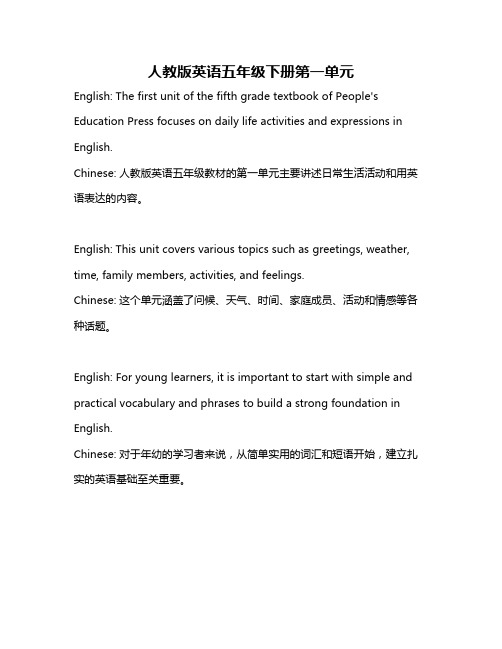
人教版英语五年级下册第一单元English: The first unit of the fifth grade textbook of People's Education Press focuses on daily life activities and expressions in English.Chinese: 人教版英语五年级教材的第一单元主要讲述日常生活活动和用英语表达的内容。
English: This unit covers various topics such as greetings, weather, time, family members, activities, and feelings.Chinese: 这个单元涵盖了问候、天气、时间、家庭成员、活动和情感等各种话题。
English: For young learners, it is important to start with simple and practical vocabulary and phrases to build a strong foundation in English.Chinese: 对于年幼的学习者来说,从简单实用的词汇和短语开始,建立扎实的英语基础至关重要。
English: By learning these daily life expressions and activities, students can effectively communicate with others in English, which is a crucial skill in today's globalized world.Chinese: 通过学习这些日常生活表达和活动,学生可以有效地用英语与他人交流,这在当今全球化的世界中是一项至关重要的技能。
English: Moreover, learning English at a young age can stimulate cognitive development, improve memory retention, and enhance problem-solving skills.Chinese: 此外,年幼时学习英语可以激发认知发展,提高记忆力,增强解决问题的能力。
人教PEP五年级上册【单元整体教学设计】Unit 1 My day PC Story time 教案

人教PEP五年级上册Unit 1 My day
单元整体设计
新课标第二部分分课时教学设计
【第7 课时】
一,语篇研读(附图)
本节课是故事篇,本课时的主题意义是通过Zoom和Zip在一起谈论Zip忙碌日常活动等,掌握如何讲述一些日常活动。
从而激发学生在真实的语言情境中来运用所学词汇和句型等。
让学生感知本节课句型的语义及语用情景。
能根据课文判断句子正误,回答相应的问题,并能情景表演故事等,养成合理安排作息时间的好习惯。
二,教学过程
核心素养教学目标
(一)学习能力目标:
1.能熟读课文完成课后相应练习并能运用所学短语和句型描述自己的日常活动
2.能在音频和图片语境的帮助下,学习听力题型和听力技巧。
3.有意识地运用所学字、词、句,培养“能听会说英语”的能力
(二)语言知识目标:
1.能在图片和文本语境的帮助下,熟练运用本单元的核心单词。
五年级下册英语一单元课文

五年级下册英语一单元课文五年级下册英语第一单元的课文内容可能因不同版本的教材而有所差异。
以人教版PEP小学英语五年级下册为例,第一单元的主要话题是“My day”,即“我的一天”。
以下是该单元的部分课文内容:Let's talk(A部分):John: What do you have on Wednesdays?Oliver: I have computer class and PE. What about you?John: I often do morning exercises and eat breakfast at 7 o'clock. Then I go to school at 7:30. Oliver: Do you often eat breakfast at 7 o'clock?John: Yes, I do. And I eat dinner at 7 o'clock in the evening.Let's learn(A部分):Monday:周一Tuesday:周二Wednesday:周三Thursday:周四Friday:周五Saturday:周六Sunday:周日Read and write(B部分):My name is Mike. I live in New York. I get up at 6:30 in the morning. I often wash my face and then I eat breakfast at 7 o'clock. I go to school at 8 o'clock. I have lunch at 12 o'clock. I go home at 3 o'clock. I have dinner at 6:30 in the evening. Then I do my homework. I go to bed at 9 o'clock. This is my day. What about you?。
人教PEP版英语五年级下册 Unit 1单元概述与课时安排
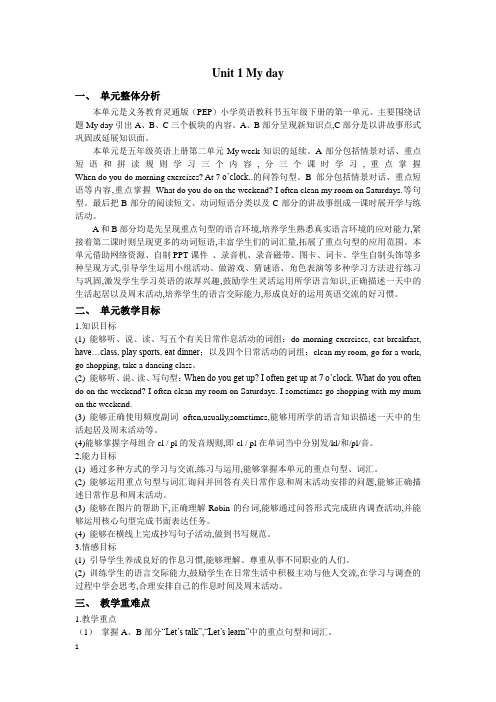
Unit 1 My day一、单元整体分析本单元是义务教育灵通版(PEP)小学英语教科书五年级下册的第一单元。
主要围绕话题My day引出A、B、C三个板块的内容。
A、B部分呈现新知识点,C部分是以讲故事形式巩固或延展知识面。
本单元是五年级英语上册第二单元My week知识的延续。
A部分包括情景对话、重点短语和拼读规则学习三个内容,分三个课时学习,重点掌握When do you do morning exercises? At 7 o’clock..的问答句型。
B部分包括情景对话、重点短语等内容,重点掌握What do you do on the weekend? I often clean my room on Saturdays.等句型。
最后把B部分的阅读短文、动词短语分类以及C部分的讲故事组成一课时展开学与练活动。
A和B部分均是先呈现重点句型的语言环境,培养学生熟悉真实语言环境的应对能力,紧接着第二课时则呈现更多的动词短语,丰富学生们的词汇量,拓展了重点句型的应用范围。
本单元借助网络资源、自制PPT课件、录音机、录音磁带、图卡、词卡、学生自制头饰等多种呈现方式,引导学生运用小组活动、做游戏、猜谜语、角色表演等多种学习方法进行练习与巩固,激发学生学习英语的浓厚兴趣,鼓励学生灵活运用所学语言知识,正确描述一天中的生活起居以及周末活动,培养学生的语言交际能力,形成良好的运用英语交流的好习惯。
二、单元教学目标1.知识目标(1) 能够听、说、读、写五个有关日常作息活动的词组:do morning exercises, eat breakfast, have…class, play sports, eat dinner;以及四个日常活动的词组:clean my room, go for a work, go shopping, take a dancing class。
(2) 能够听、说、读、写句型:When do you get up? I often get up at 7 o’clock. What do you often do on the weekend? I often clean my room on Saturdays. I sometimes go shopping with my mum on the weekend.(3) 能够正确使用频度副词often,usually,sometimes,能够用所学的语言知识描述一天中的生活起居及周末活动等。
人教PEP版英语五年级下册《Unit 1 Part B 第一课时》教学课件

have English class
play sports
I do you say.
get up
watch TV
go to bed
I do you say.
play ping-pong
cook dinner
wash my clothes
I do you say.
clean my room
eat dinner
Listen and answer.
Sarah often watches TV and plays ping-pong on the weekend. Is she hard-working on the weekend?
Yes, she is hard-working. She usually washes her clothes. Sometimes she cooks dinner.
Every weekend I go shopping. What do you do? What do you do? Every weekend I go hiking. What do you do? What do you do?
Lead in
Let’s try
Where is Sarah? Listen and circle.
Sarah:I often watch TV and play ping-pong with my father.
Shopkeeper:That sounds like a lot of fun.
Sarah:Yes, but I’m also hard-working. I usually wash my clothes.
句型结构:What do you do + 时间状语? 回答:I/We (+ 频度副词) + 动词(短语)(+其他).
小学英语五年级下册《Unit 1 My day》教学设计(人教PEP版)
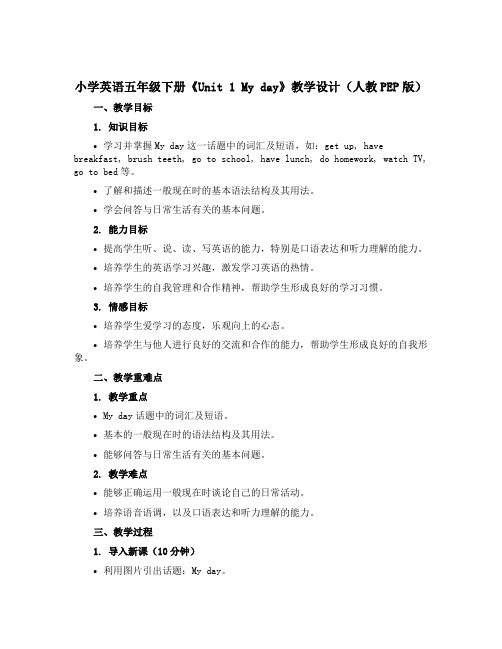
小学英语五年级下册《Unit 1 My day》教学设计(人教PEP版)一、教学目标1. 知识目标•学习并掌握My day这一话题中的词汇及短语,如:get up, have breakfast, brush teeth, go to school, have lunch, do homework, watch TV, go to bed等。
•了解和描述一般现在时的基本语法结构及其用法。
•学会问答与日常生活有关的基本问题。
2. 能力目标•提高学生听、说、读、写英语的能力,特别是口语表达和听力理解的能力。
•培养学生的英语学习兴趣,激发学习英语的热情。
•培养学生的自我管理和合作精神,帮助学生形成良好的学习习惯。
3. 情感目标•培养学生爱学习的态度,乐观向上的心态。
•培养学生与他人进行良好的交流和合作的能力,帮助学生形成良好的自我形象。
二、教学重难点1. 教学重点•My day话题中的词汇及短语。
•基本的一般现在时的语法结构及其用法。
•能够问答与日常生活有关的基本问题。
2. 教学难点•能够正确运用一般现在时谈论自己的日常活动。
•培养语音语调,以及口语表达和听力理解的能力。
三、教学过程1. 导入新课(10分钟)•利用图片引出话题:My day。
•让学生通过图片描述“洗脸”、“刷牙”等日常活动,引导学生进入Myday这一话题。
•引导学生回答问题:“What do you usually do in the morning?”2. 新课讲解(30分钟)•通过图片和语音练习帮助学生学习词汇及短语,如:get up, have breakfast, brush teeth, go to school, have lunch, do homework, watch TV, go to bed等。
•通过示范和训练,教授一般现在时的语法结构及其用法,包括:主语+动词原形+其他,例如:I get up at six o’clock. He goes to school by bus. They have lunch at noon.等。
英语人教PEP版五年级下册Unit 1 第一课时教案

第一课时一、课时内容教科书第4页:A. Let’s try Let’s talk Role-play二、课时分析本课时是义务教育灵通版(pep)小学英语教科书五年级下册的第一单元第一课时,围绕“询问对方一天中的作息时间”这个话题展开内容。
包括Let’s try,Let’s talk和Role-play 三个板块。
Let’s try是听力训练,是为Let’s talk部分做铺垫的。
Let’s talk是围绕本单元的总话题My day展开的第一个对话场景,即张鹏与佩德罗谈论有关西方小学生日常作息时间的对话,呈现了When do you…?的句型,通过张鹏询问佩德罗上午什么时候放学,午饭之后什么时候上学,以及什么时候吃晚饭等一系列问题,可以了解西方国家小学生的作息时间与我们中国的小学生的大不相同,引导学生通过积极地询问,会得到很多意想不到的信息。
Role-play是为专项训练句型When do you…?创作的问答表演活动,用以巩固重点句型的熟练程度。
本课时是整个单元的首课时,在本单元中起引领与铺垫作用,重点掌握when do you…?的问答句型和一些常用动词短语。
对话中呈现了三个句型相同内容不同的问句,加深了学生对该句型的认知度,接下来又呈现了四幅图,分别代表不同职业的人,学生们通过扮演不同职业的人,运用句型when do you…?进行问答活动,从而了解不同职业的人,起居生活也不同,感悟到工作人员的辛苦与坚韧的高贵品质。
五年级的学生,有着三、四年级的学习英语的经历,具备一定的语言感知能力,因此我准备采用多次呈现对话情景动画,通过声形并茂的方式,感染学生,使学生在新授之前,就可以了解对话内容,再鼓励学生模仿表演对话,感知新句型的应用功能,最后再提炼重点句型,通过游戏活动加以巩固。
三、课时目标1.能听说认读单词“when,after,start,usually,Spain,late”。
2.能听懂、会说、运用句型“When do you finish class in the morning?”“We finish class at 1 o’clock.”3.知道助动词do在问句中的作用与用法。
人教PEP 小学英语 五年级下册 Unit1单词(带音标和例句)
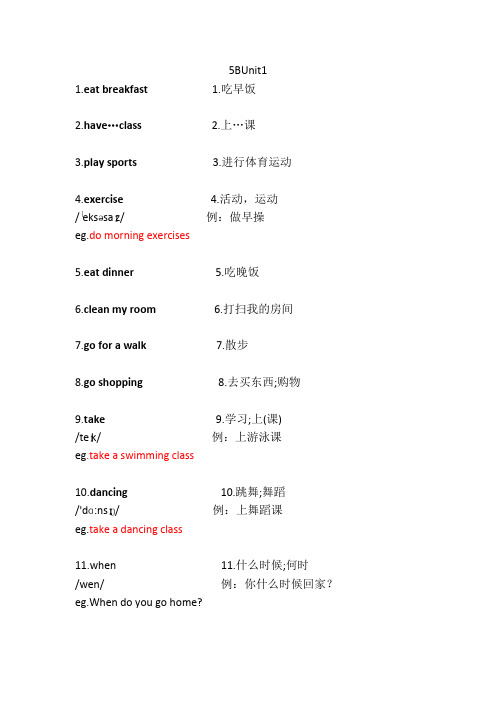
5BUnit11.eat breakfast 1.吃早饭2.have…class 2.上…课3.play sports 3.进行体育运动4.exercise 4.活动,运动/ˈeksəsaɪz/ 例:做早操eg.do morning exercises5.eat dinner 5.吃晚饭6.clean my room 6.打扫我的房间7.go for a walk 7.散步8.go shopping8.去买东西;购物9.take9.学习;上(课)/teɪk/ 例:上游泳课eg.take a swimming class10.dancing 10.跳舞;舞蹈/'dɑ:nsɪŋ/ 例:上舞蹈课eg.take a dancing class11.when 11.什么时候;何时/wen/ 例:你什么时候回家?eg.When do you go home?12.after 12.在(时间)后/ˈa:ftə(r)/ 例:放学后eg.after school13.start 13.开始/sta:t/ 例:我八点开始上课eg.I start class at 8 o’clock.ually 14.通常地;惯常地/ˈju:ʒuəli/ 例:我通常六点起床。
eg.I usually get up at six.15.Spain 15.西班牙/speɪn/ 例:在西班牙eg.in Spainte 16.晚;迟/leɪt/ 例:麦克上学迟到了。
eg.Mike is late for school.17.a.m. 17.午前;上午/ˌeɪˈem/ 例:上午七点eg:7:00 a.m.18.p.m. 18.午后;下午/ˌpi:ˈem/ 例:下午七点eg:7:00 p.m.19.why 19.为什么/waɪ/ 例:你为什么迟到了?eg.Why are you late?20.shop 20.去买东西;购物21.work 21.工作/wɜ:k/ 例:我妈妈昨晚通宵工作。
Unit1MydayCstorytime(课件)-人教PEP版英语五年级下册(1)

How about you?
words to know
nut 坚果
There are many kinds of nuts.
Its shell is very hard.
It is the essence(精华) of the plant(植物). It is very nutritious(营养). It is good for your health.
Unit 1 My day
Part C Story time
Free talk
When do you do on the weekend?
I often... at... on...
3:00p.m.
5:00p.m.
9:00a.m.
10:00a.m. 4:30p.m.
5:20p.m.
Guess and think
What does Zip do from Monday to Wednesday? 从...到...
Monday
Tuesday
Wednesday
collect nuts
收集坚果
What does Zip do on Thursday ?
dry nuts 晒坚果
Zip is very busy
Which animal likes eating nuts ?
A
B
Squirrels like to eat nuts.
松鼠
What is the squirell doing?
collect nuts
收集坚果
Story Time
I'm always very busy
Why is Zip very busy?
- 1、下载文档前请自行甄别文档内容的完整性,平台不提供额外的编辑、内容补充、找答案等附加服务。
- 2、"仅部分预览"的文档,不可在线预览部分如存在完整性等问题,可反馈申请退款(可完整预览的文档不适用该条件!)。
- 3、如文档侵犯您的权益,请联系客服反馈,我们会尽快为您处理(人工客服工作时间:9:00-18:30)。
词语解析
dry [draɪ] 使...变干 dry my nuts 使我的坚果变干 in the sun在阳光下
Zoom: What else? Zip: On Thursday, I often
dry my nuts in the sun.
快快长大:in the sun 在英语思维中, 太阳是很大的,
Zip always very busy. Guess, what does she do everyday?
Let's see!
What does Zip usually do on the weekend?
Zip usually watches TV on the weekend.
How about this weekend? I have a show I'll play the pipa. Zip has a show. She will play the pipa.
What does Mike do on the weekend?
What does Sarah do on the weekend?
He usually does his homework. She usually...
Sometimes he goes hiking.
Sometimes she...
本节课我们了解了Zip一周的活动。Zip很忙, 差 点忘记了这个周末自己要参加节目,还好及时想 起来才没有迟到。Zip 和朋友分享自己最喜欢的 坚果是一种美德,我们要向她学习学会分享哦!
1 读故事给伙伴或家长听。 2 制作自己一周的活动安排表格,和伙伴Βιβλιοθήκη 分享。自己读故事,完成表格。
词语解析
collect [kəˈlekt] 收集、收藏 collect nuts 收集坚果 I usually collect nuts in the afternoon. 我通常在下午收集坚果。
Zip: Let me see. From Monday to Wednesday, I usually collect nuts in the afternoon.
汉语的阳光下, 在英语里就是in了, 沐浴阳光里的意思. 在阳光下的英文是in the sun而不是under the sun.
词语解析
eat nuts 吃坚果
I eat nuts with my friends.
Zip: On Friday, I eat nuts
我和我的朋友一起吃坚果。
with my friends.
Unit 1 My day
PEP 五年级下册
Story time
read do morning exercises play sports clean my room go for a walk take a dancing class go shopping
talk what do you do on the weekend?
Zoom: What do you usually do on the weekend?
Zip: I often watch TV, but this weekend I have a show. I'll play the pipa.
What does Zip do everyday?
Monday Tuesday Wednesday Thursday Friday weekend
一、看图讲故事
二、判断对(T)错(F)
( F ) 1. It is Sunday now. ( T ) 2. Zip often watches TV on the weekend. ( F ) 3. From Monday to Wednesday, Zoom often
collects nuts. ( T ) 4. On Friday, Zip often eats nuts with her friends. ( T ) 5. This weekend, Zip will have a show.
What does Zip do from Monday to Friday?
Monday Tuesday Wednesday Thursday Friday weekend
usually collect nuts
dry nuts eat often nuts watch TV
1. 跟读故事。 2. 分角色朗读 3. 简单讲述故事内容
快快长大:学会分享
Zip 在星期五和朋友一起吃坚果。她辛辛苦苦收集坚果、 晒干坚果,不是自己独享而是和朋友分享,是一件很 开心的事情。因为分享是一项传统美德,是一项生活 技能,与人分享快乐,能使别人更快乐,自己也快乐。 分享会使烦恼减半,快乐加倍。在分享的同时,性格 会得到锻炼。分享有助于做更明确的决定。
